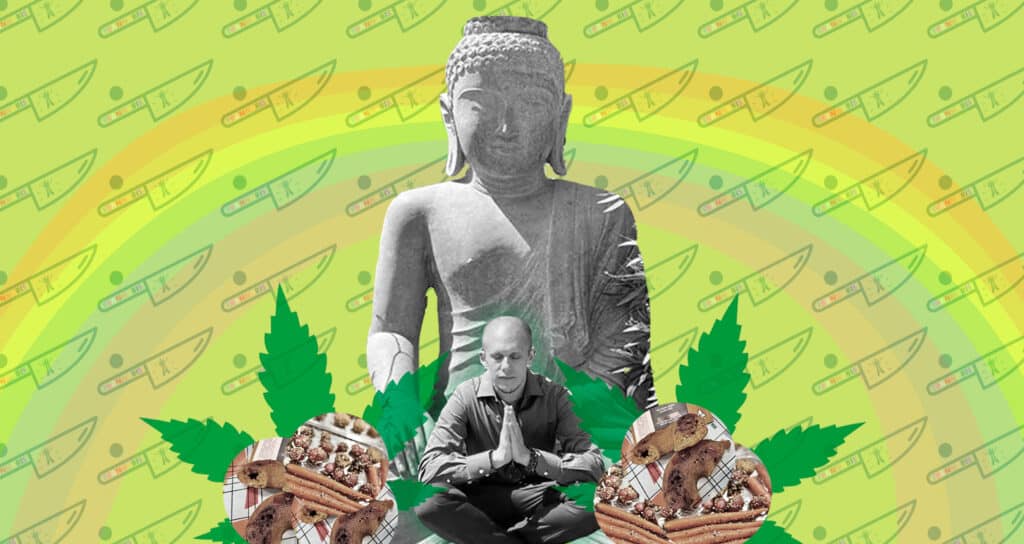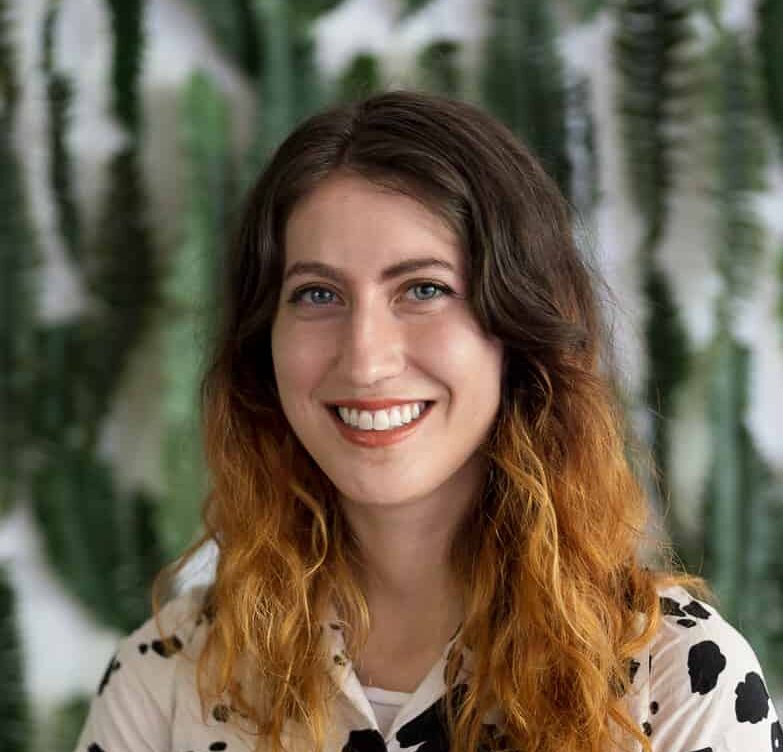If there’s one thing most cannabis enthusiasts can agree on, it’s that the plant pairs well with food. Many others will say it helps strengthen spirituality. When the two come together, with the help of a strong teacher, it can spark something beautiful.
Jamie London Wollberg (he/they) is a cannabis chef and spiritual wellness coach who has taken a world of challenges and pivoted the experiences into a successful business. Bedridden throughout his early to mid-twenties, he became one of the first 300 people in New York to access medical cannabis through the state’s program.
“The dispensary had three colors and could basically tell me very little about [the products]- nothing like the access to knowledge many of us have today,” he told me. “I often get emotional recounting my first experience in a dispensary in New York, especially when I compare it to my experience in LA.”
In the ensuing years, Wollberg has grown from patient to chef and spiritual wellness coach under the name Trannabis LLC. He operates the Trannabis Kitchen to teach people how to cook intuitively with cannabis, and runs Trannabis Chi, a plant-infused spiritual wellness company. Rooting his work in activism, he’s also run workshops in the past, including a cannabis 101 class for people in AA who are new to cannabis.
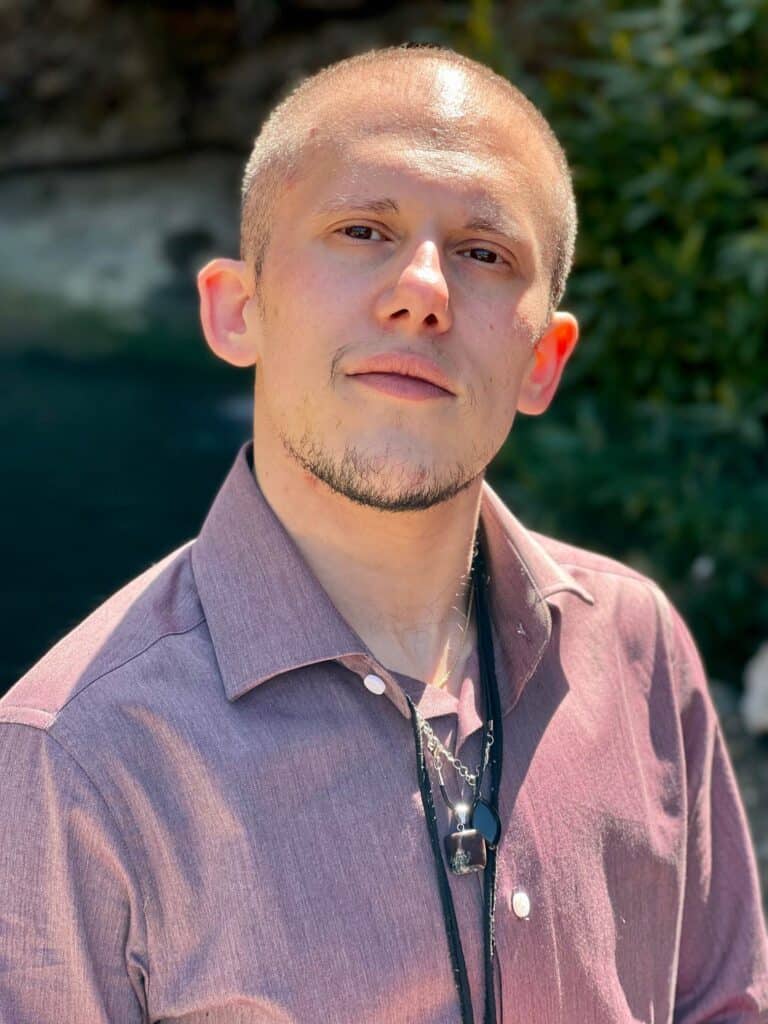
Wollberg has been passionate about cooking since he was ten years old. He later went to the Culinary Institute of America for a short time before transferring to SUNY Purchase, where he ran a cooking show, “Baked with Jamie Wollberg” airing on Brick TV. The Trannabis Kitchen was born nearly a year into the pandemic, when Wollberg went live on Instagram and realized he could share his cooking skills with his network. Today, the Trannabis Kitchen features cannabis guests and products to showcase the many ways to cook with cannabis, including features with vegan edibles brand Fruit Slabs.
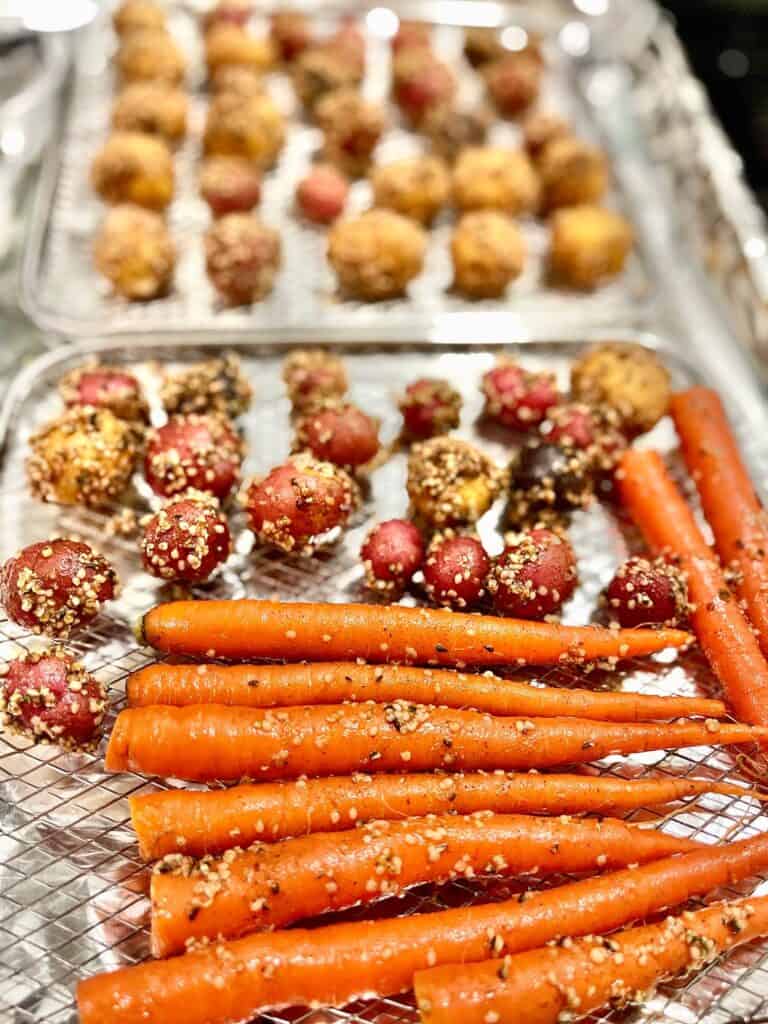
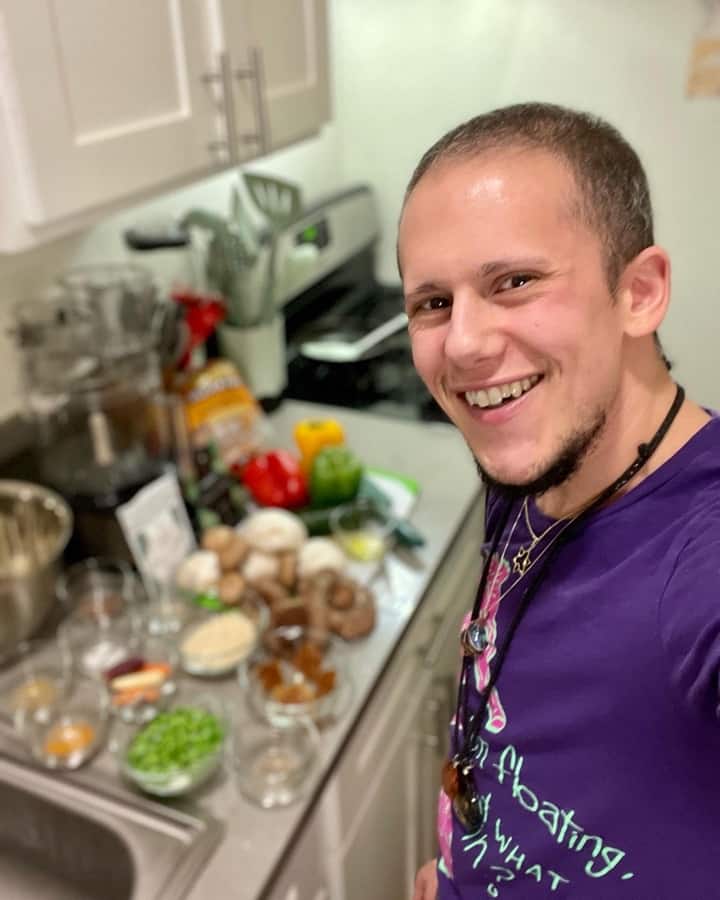
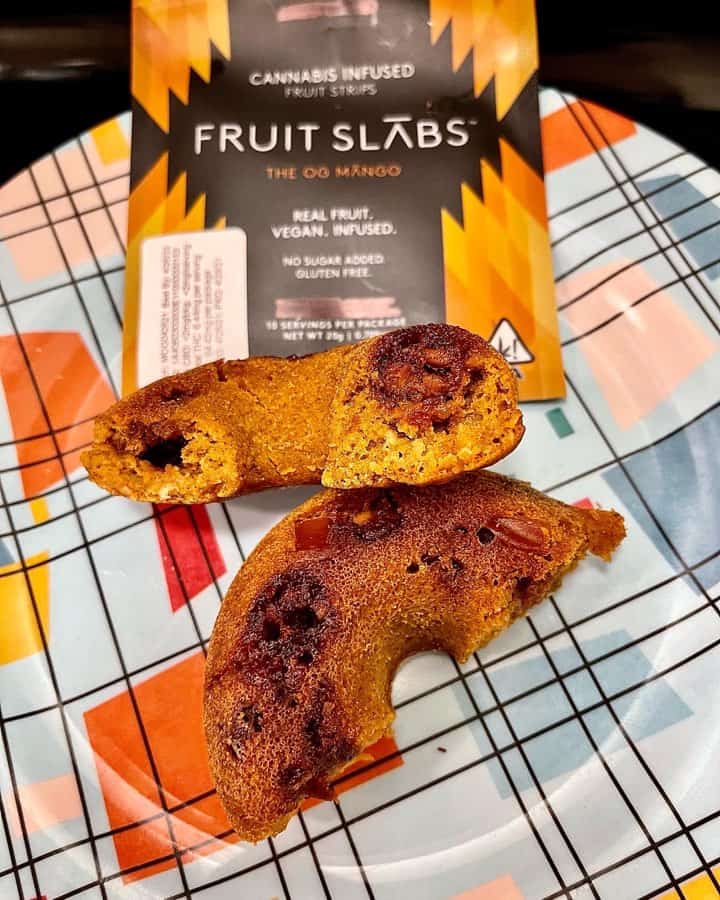
As a disabled queer person, London Wollberg has experienced a much different cannabis industry than, say, your average executive. We’ve seen the cannabis industry leave out disabled people, both business owners and consumers. And the industry is made up of mostly white and male leaders, few of which, at least openly, have identified as part of the LGBTQ community. Seeing Wollberg’s identity reflected back at him in this industry is rare, and opens up conversations that are often skipped over. It also lends itself to extra hurdles.
“I haven’t found an effective platform to market and it’s a huge problem,” Wollberg explains. “Visibility is everything and there is so much red tape from both cannabis and being trans (queer and disabled, not as much, though that can factor too.) Right now, I’m leaning into LinkedIn where I have a bit more room to play authentically. I utilize YouTube because I need somewhere to put my video content.”
We wanted to dive a little deeper into Wollberg’s experience running a cannabis business in his corner of the world, as well as highlight some of the accessibility issues the industry is plagued with, so we bring you this Q+A with Trannabis LLC’s founder, Jamie London Wollberg.
What brought you into cannabis?
JLW: My health journey, which includes the medical aspects of my gender transition and autoimmune conditions believed to have stemmed from getting Lyme Disease at age twenty-one.
The doctors did their best–I believe that. However, at times many didn’t know what they were doing because it was taking so long to figure out what was wrong with me. Given my disability experience is not always obvious, there was a lot of doubt and confusion. It felt most of the time like they were attempting to disprove and discredit my story, as well as my experience, which is super common not only for disabled queer trans men, but even more so for people of color within the community. The point is — I’m not alone in this. Eventually, I did get diagnoses, with some of them correct and some not. At the end of the day, the biggest lesson was that I needed to trust my intuition because everything I believed I was experiencing turned out to be true.
One of the doctors I trusted most suggested I start over in a new place with a new, and more stable climate, as well as one with more options for alternative health care. I had exhausted many of the foremost experts on the east coast.
So, I got to digging and discovered that Los Angeles made the most sense for me. They took accessibility way more seriously. As an adult early in my life, single, experiencing disability, and moving across the country–I needed to know I would be respected and cared for properly. It’s another LGBTQAI2S+ Mecca in the world, even more so than New York, which I didn’t fully believe until I arrived. I can say it’s the truth. Cannabis was WAY ahead, by what I perceive to be a decade, of New York at the time. I knew I could get access to so much more…. And LA was known for being a great place for the gender expansive community to thrive through transition. I needed all of that and more.
So with so much at stake, the move was mandatory. I was on a mission to save my life and determined to do so because my next step was to support everyone else who needed it through their own journeys, especially those with marginalized experiences. That’s exactly what I set out to do and I continue to do so. It’s what I am doing and it’s a huge part of who I am.”
What experience have you had with finding community within the cannabis space?
JLW: I have managed to find some incredible people in the industry who I feel connected to on various levels, and I have the deepest love and appreciation for them. Many don’t see me, and they do. The biggest challenge for me has been both finding and building a close relationship with the LGBTQAI2S+ community within the cannabis space. Some might assume with the old stereotypes that we all know each other and WE DON’T. The pandemic threw a major wrench in the ability to connect and build upon those bonds. Social media helps AND it’s not the same. Building community takes time and effort and it doesn’t happen with just one person. I always say, there’s a reason there are more than seven billion of us on the planet.
What healing have you received from cannabis?
JLW: Cannabis enables me to be my best and highest-self. (Both as a person and spiritually speaking, I’m actually not aiming to be the highest I can be in any moment–I want to feel better and function my best). Cannabis massively helps with my pain, which used to be a 10/10 24/7. Now on my best days I can bring it down to a 3/4. On average I’m at a 6/7. Cannabis helps me emotionally to find my calm and to get clarity. It helps me to be creative. Cannabis has supported me through my spiritual journey. I have clearer channeling when cannabis is involved. The list goes on and on. Over the years, it has really been cannabis in collaboration with spiritual wellness, which continues to save my life. Now I spend every chance I get bringing my gifts and that awareness to the collective to empower them to heal themselves, as well.
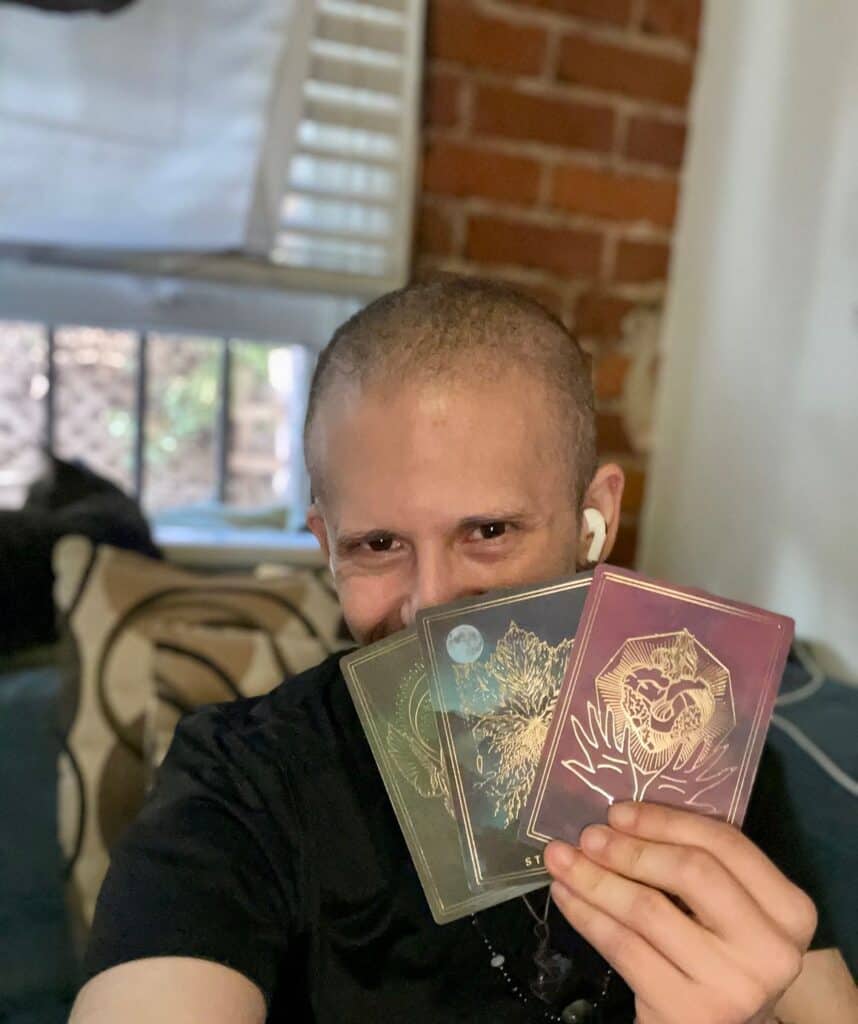
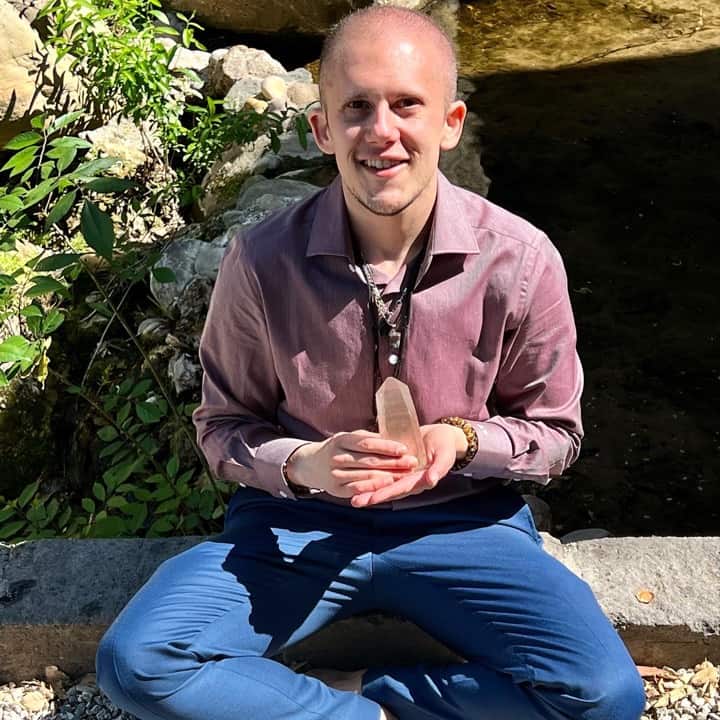
Do you want to speak to the challenges you’ve faced in the industry?
JLW: How much time do you have? What I’m about to say is not ONLY about the gender expansive community. I am a queer and transgender man living with a neuro-diverse and disabled experience. Any ounce of privilege I have in comparison to others with my experience is the fact that I am white. It’s a massive privilege that gives me advantages my siblings of color don’t get and I think about that a lot. I think a lot about the role I have played in that and what role I choose to play now –to be and do better. With that said, there’s a big theme at the core of all of this – accessibility. Now, I’m not going to be able to touch upon every single thing in detail right now, so here are some cliff notes.
As a queer person in cannabis, it upsets me to see how much we get simply erased out of the cannabis industry. We are often erased from the LGBTQAI2S+ community as the term holds much historical weight, and therefore opinions surface to match.
As a transgender person, the same things about being queer are there AND MORE. Transphobia is rampant within the world and it exists in this industry. In general, a lack of care and compassion for the gender expansive community as a whole is very much present in society on all levels. It’s not always obvious. An example – when I first got into the industry, a big company was interested in hiring me. Initially, they had offered me a spot at their store, where I felt I would be safe, especially because I was far earlier in my transition than I am now, so I didn’t always pass as a man. They then changed that decision to another store, which, as a disabled person and someone who was lacking funds through those circumstances, was not as easy for me to access. I couldn’t take that job because I would have been fired for needing time off for my health and gender-affirming surgeries.
As a neuro-diverse person, I find myself at a disadvantage when it comes to training and learning opportunities, as well as in conversation with others. Unless I out myself and make my needs known (which is true for all of my identifiers) then they aren’t met. This isn’t new for me in the world and I truly wish in an industry where there is meant to be compassionate care, I felt compassionately cared for. I don’t learn the same way and sometimes I feel really awkward in the social situations where I am confused, especially when everyone else is on board.
When it comes to living a disabled experience, many events in the industry and beyond aren’t accessible. Plus, there are places that have legalized and do not have delivery, which is a massive issue. In LA, we have delivery and during the pandemic when everything was closing down, that was halted. What did that mean? No cannabis. It meant having to hunt around for ways to get at least CBD delivered or going back to the legacy market. (I say this respectfully, as we all exist in this industry because of the legacy market.)
Another issue that’s not been resolved is the containers – the packaging of products. The majority of these “child-proof” packages are also adult-proof, especially if you’re living with disabilities. I am thirty-three and I am constantly fighting with packaging. The most recent example, I couldn’t find my hammer, which was actually what I needed to open a container of flower from a very well respected company, a company I love and who is focusing more on sustainability. I started to use my protective door stopper. I used the bottom rubber stopper to smash down on it. So then I took a rubber mini mat grabber and that didn’t do it either. I tried smashing it against the counter and the floor, as well as my table. I even gave it Reiki — I’m completely serious. I prayed for it to open. Eventually, the winner was some kitchen scissors and stabbing it as if we were in a horror film. Then I had to shake out the flower through the smaller hold I was able to make and then I had to sift through to make sure I didn’t have any shards of recycled plastic in my flower. Is this REALLY considered acceptable, especially when our growing population are senior citizens?
Again, I want to stress heavily that I’m not alone and that my white privilege gives me a major advantage compared to my siblings in these experiences who are people of color. I also want to say that my privileges along with anyone else, doesn’t erase the rest of my experience.
What types of cannabis do you prefer to use for your work and practices?
JLW: I consume a wide variety of cannabinoids and terpenes that I have found to fit my needs at the potency I need them. I use the Nugg Club monthly box, however, that’s not always what I need. I use that more to save money and discover more options of what might help me. I otherwise get delivery through EAZE or CCA2Go. All I care about is that it helps me with healing and is as affordable as possible. The terpenes are the most important part, followed by potency. I use a CBD:CBG tincture three times a day; otherwise I mostly smoke flower and create my own edibles. From the very start of my trainings, I encourage clients to find what is most effective for them and to microdose, even if they tend to use higher doses. I won’t stop someone from using more when they need more, and I let them know we will be utilizing healing with the plant spirit differently. Starting low and going slow in these new environments can make a huge difference in the result of their experience with me. If they ask for specific recommendations, I’ll want to consult with them to know what their needs are, what has helped, and what hasn’t. I am not a medical professional or a certified cannabis nurse, so in most cases I recommend they consider talking to the cannabis nurses at Leaf411.org, regardless. They are responsible for obtaining their cannabis, except for particular circumstances with some live events when it’s donated by sponsors.
How did you develop your brand’s voice and aesthetic?
JLW: The only considerations that matter to me: love and being myself.


